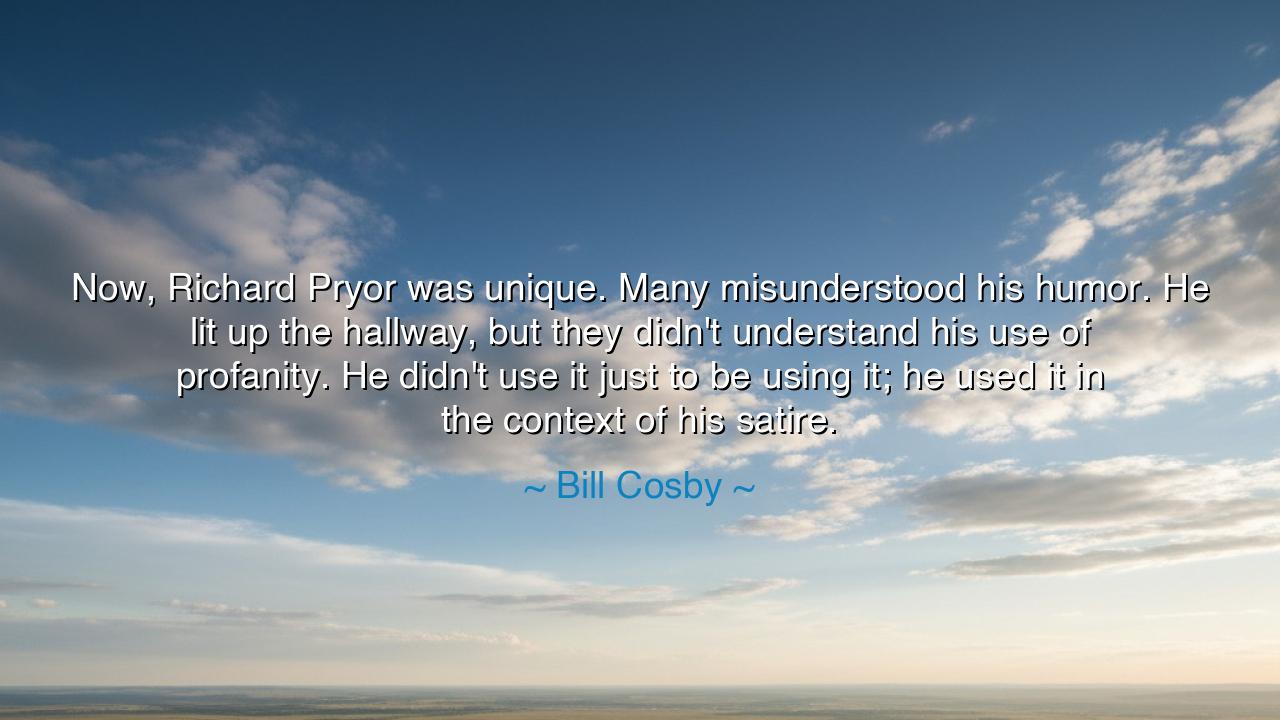
Now, Richard Pryor was unique. Many misunderstood his humor. He
Now, Richard Pryor was unique. Many misunderstood his humor. He lit up the hallway, but they didn't understand his use of profanity. He didn't use it just to be using it; he used it in the context of his satire.






When Bill Cosby said, “Now, Richard Pryor was unique. Many misunderstood his humor. He lit up the hallway, but they didn't understand his use of profanity. He didn't use it just to be using it; he used it in the context of his satire,” he was not merely speaking of a man—he was speaking of a force of nature. In this reflection, Cosby paid tribute to a truth that echoes through all ages: that true art is often misunderstood, and that the power of words—even those deemed impolite or shocking—lies not in their sound, but in their intent. His words are not simply about comedy; they are about courage, about the rare souls who dare to speak truth in the only language their time will hear.
The origin of this quote rests in the legendary life of Richard Pryor, one of the most influential comedians the world has ever known. Pryor was a mirror to his generation—raw, unflinching, and deeply human. His humor was not built on easy laughter, but on revelation. He spoke of race, pain, addiction, and love with such honesty that his audience could not help but confront their own souls. To some, his language was vulgar; to others, it was liberation. Cosby’s defense of Pryor was an acknowledgment that Pryor’s profanity was not rebellion for its own sake—it was truth clothed in the garments of the street, a reflection of the world as it truly was, not as polite society pretended it to be.
When Cosby said Pryor “lit up the hallway,” he was describing the radiance of authenticity—the kind of light that exposes both the beauty and the blemishes of life. Pryor’s comedy did not seek to comfort; it sought to awaken. Every word he spoke, even the roughest, was part of a grand tapestry of satire, crafted to reveal hypocrisy, to challenge power, to give voice to the voiceless. His profanity was a tool, not a weapon—a rhythm of the oppressed, a music of frustration transformed into laughter. He was, in the ancient sense, a truth-teller, the fool who dared to speak what kings would not hear.
Throughout history, those who wield humor as a blade of truth have often been misunderstood. Consider the philosopher Diogenes of Sinope, who lived in a barrel and mocked the powerful with crude honesty. When Alexander the Great asked if he could grant him a wish, Diogenes replied, “Yes—stand out of my sunlight.” His words, though simple and insolent, cut through the illusion of grandeur and revealed the equality of all men. Like Pryor, Diogenes used shock not to offend, but to enlighten. The rawness of their language was the doorway through which truth entered—the unpolished vessel that carried divine insight.
Pryor, too, understood that laughter is sacred medicine, and that sometimes the medicine must sting to heal. When he spoke of his struggles with addiction, or of the violence and poverty he had known, he did not hide behind gentility. He gave his audience the truth unfiltered, and in that truth, they found release. What others heard as profanity was, in truth, pain transformed into poetry. He did not curse to destroy, but to reveal the curses already laid upon his people—the injustice, the neglect, the wounds of a society afraid to look at itself. Through humor, he sanctified the unspeakable. Through laughter, he taught empathy.
Cosby’s admiration for Pryor reveals a profound lesson about the power of context. Words themselves are neutral—it is their purpose that gives them life or death. A fool curses to provoke, but a wise man uses even harsh words to teach. Pryor’s satire turned profanity into a weapon of understanding; it pierced through pretense and forced his audience to confront what they would rather ignore. This is the mark of all great art—to unsettle the comfortable and comfort the unsettled. To those who listened with open hearts, Pryor’s so-called profanity was not offensive—it was prophetic.
And so, my children of truth and expression, take this wisdom to heart: do not judge words by their sound, but by their soul. Look beneath the surface of language, and ask—what is it trying to awaken in me? The ancients knew that the prophet is often mistaken for a madman, and the truth-teller for a fool. Do not fear the rough edges of expression, for sometimes they are the only shapes that can cut through the armor of indifference. Like Pryor, speak your truth with courage; like Cosby, learn to see the meaning beyond the manner. For humor, when joined with honesty, becomes a sacred act—a bridge between pain and understanding, between chaos and clarity.
Thus remember this lesson: true humor is born not from jokes, but from justice; not from insult, but from insight. As Richard Pryor did, use your voice—whether polished or raw—to shine light into the world’s dark corners. Speak with purpose, not for approval. Let your words, however strange or shocking, be guided by empathy. For it is not the prettiness of speech that matters, but its power to reveal truth. And when the world misunderstands you, as it misunderstood Pryor, take heart—for that is often the sign that your light burns brightly in a place still learning how to see.






AAdministratorAdministrator
Welcome, honored guests. Please leave a comment, we will respond soon